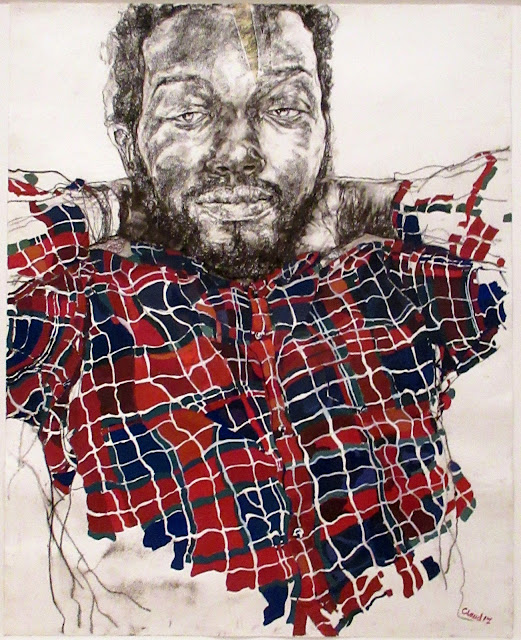A few years ago I saw two paintings by Claudette Johnson at the Herbert Art Gallery in Coventry which I really liked. So, when I saw that there was an exhibition of her work at the Courtauld, we decided to go and find out more about this artist who creates such powerful paintings.
Throughout her career, Claudette Johnson has pioneered the use of drawing on an epic scale to create depictions of black women and men that are at once intimate and monumental. Johnson's drawings are carefully observed but she does not consider them portraits in any conventional sense. Her aim is to assert the presence of her figures in ways that are vivid and complex.
Born in Manchester in 1959, Johnson came to prominence in the early 1980s whilst still an art student at Wolverhampton Polytechnic. Inspired by the exhibition Black Art an' done at Wolverhampton Art Gallery, she joined the BLK Art Group, an association of young black artists seeking visibility within the British art establishment. Johnson became a powerful voice for black feminism and exhibited in pioneering shows curated by Lubaina Himid.
During the 1980s, Johnson began depicting black women, working either from her imagination, photographs she found inspiring, or from sitters. She sought to address the marginal presence of black women in art and visual culture with her first large-scale drawings. These monumental images of women, which often exceed the size of the paper, became a hallmark of Johnson's art.
Johnson created this work during her last year studying art at Wolverhampton Polytechnic. The work is partly a response to Pablo Picasso's painting Les Demoiselles d'Avignon. Johnson has spoken of wanting to reclaim the image of the black female body, which as in that work, is too often controlled, fetishised and sexualised. In contast, Johnson's figure, brought to life from a fractured array of colours and forms, asserts her independent presence. The work's title is taken from a poem by the writer Gail Murray that concludes 'and I have my own business in this skin and on this planet'.
This drawing is part of a group of works Johnson made of herself shortly after the birth of her second child. She has spoken of having 'ambivalent feelings towards working with images of women who are naked because of the exploitative history of 'nude' painting in art'. However, her ambition is to create drawings of women who 'are so obviously engaged in creating themselves' that they challenge and redefine those traditions, offering new ways of depicting black women.
Trilogy: Woman in Blue, Woman in Black, Woman in Red, 1982-86, (watercolour, gouache and pastel on paper)
Full of movement and energy, this drawing depicts a woman who seems to twist and dance her way out of the sheet.
Blues Dance, 2023, (pastel, watercolour and gouache on paper)
Reclining Figure, 2017, (pastel and gouache on paper)
The drawing is based on a photograph that reminded Johnson of 'the position that my mum would adopt in the evening when she was tired and lay down on the sofa after a long day'. With this work, Johnson reclaims the conventional genre of the reclining female figure - a prominent feature of western art - and makes it her own.
Since 2015 men have become a subject of Johnson's paintings.
Young Man on Yellow, 2021, (pastel and gouache on paper)
Figure in Blue, 2018, (pastel and gouache on paper)





















No comments:
Post a Comment